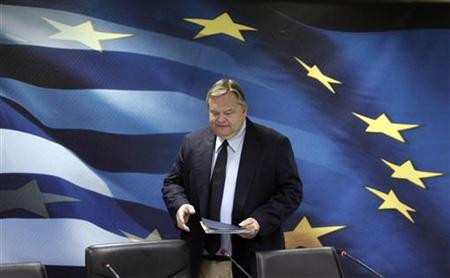Greece Will Get Loans in Time to Avoid Default, Says Finance Minister

Greece will receive the next batch of bailout loans in time to avoid a disastrous default, the finance minister said on Tuesday.
The news has arrived as the markets rallied on hopes that the Prime Minister will discuss new ways of solving the crisis with Germany's leader later in the day.
Reports that European leaders are coming up with inventive ways to resolve the debt of Greece and other countries have buoyed spirits in the financial markets, though officials in Chancellor Angela Merkel's government have downplayed such speculation.
The current plan is to have Greece endure painful debt-reduction measures in exchange for rescue loans.
Greece's international creditors are holding up payment of the next batch of loans until a review of the reform is completed in the coming days. Without the money, Greece faces bankruptcy in mid-October, which could send devastating shock waves through the financial sector in Europe and abroad.
"I am very confident in...the disbursement of the sixth tranche," Finance Minister Evangelos Venizelos said, speaking above the sound of chanting from protesting tax office workers outside the ministry. "But we must do what has been agreed."
The minister has already said that the country has gone through great lengths to achieve its fiscal targets, but a "hyper-effort" was necessary to fully meet its commitments.
Some experts aren't convinced that the current course of austerity is enough and Greece will actually need a bigger debt relief. Analysts say that this could be imposing tougher losses on private bondholders, boosting capital in European banks that would take such losses, and increasing the size of the rescue fund.
Greece had originally expected debt inspectors from the International Monetary Fund, the European Central Bank and the European Commission to complete a review of its finances in September and approve the sixth installment of loans from its €110 billion ($149 billion) bailout.
But the inspectors, known collectively as the troika, suspended their review earlier this month amid talk of missed targets.
Venizelos said the troika would return to Athens this week, and that the next bailout installment, worth €8 billion ($10.8 billion), would be paid out in time.
Greece has recently announced new debt-reducing measures, including pension cuts and tax hikes. This fuelled outrage amongst the Greeks who have already suffered through a year of austerity.
Unions have responded with repeated strikes and protests. Public transport workers walked off the job Tuesday for two days, and were to be joined by taxi drivers on Wednesday. Tax office workers were also on strike.
Given the sacrifices being made by ordinary Greeks, Prime Minister George Papandreou said the "persistent criticisms levelled against Greece are deeply frustrating."
"You as businesspeople, you know that inspiration, innovation and motivation are important parts of success," he told representatives of Germany's leading industries. "If people feel only punishment and scorn, this crisis will not become an opportunity - it will become a lost cause."
© Copyright IBTimes 2025. All rights reserved.

















